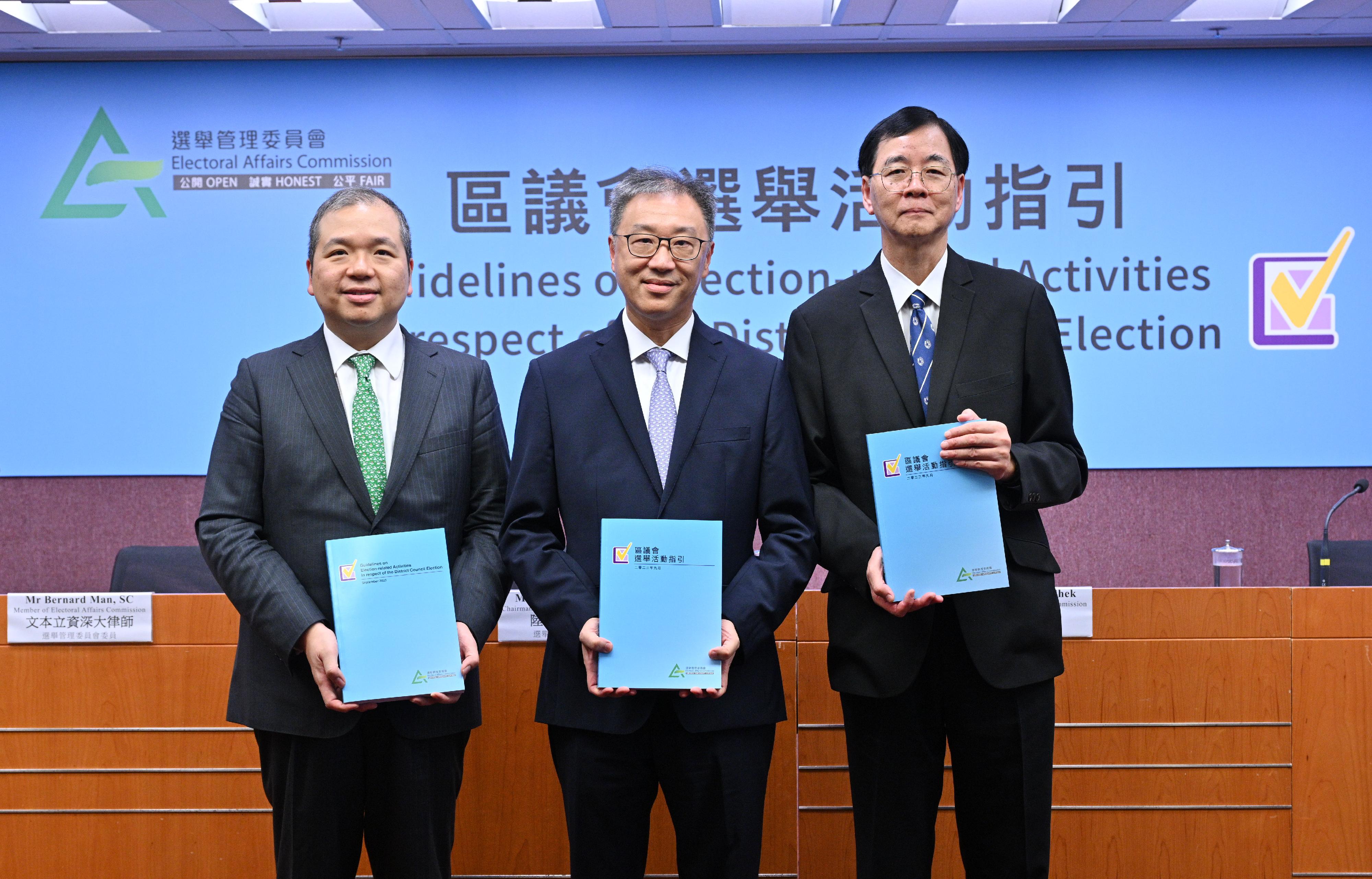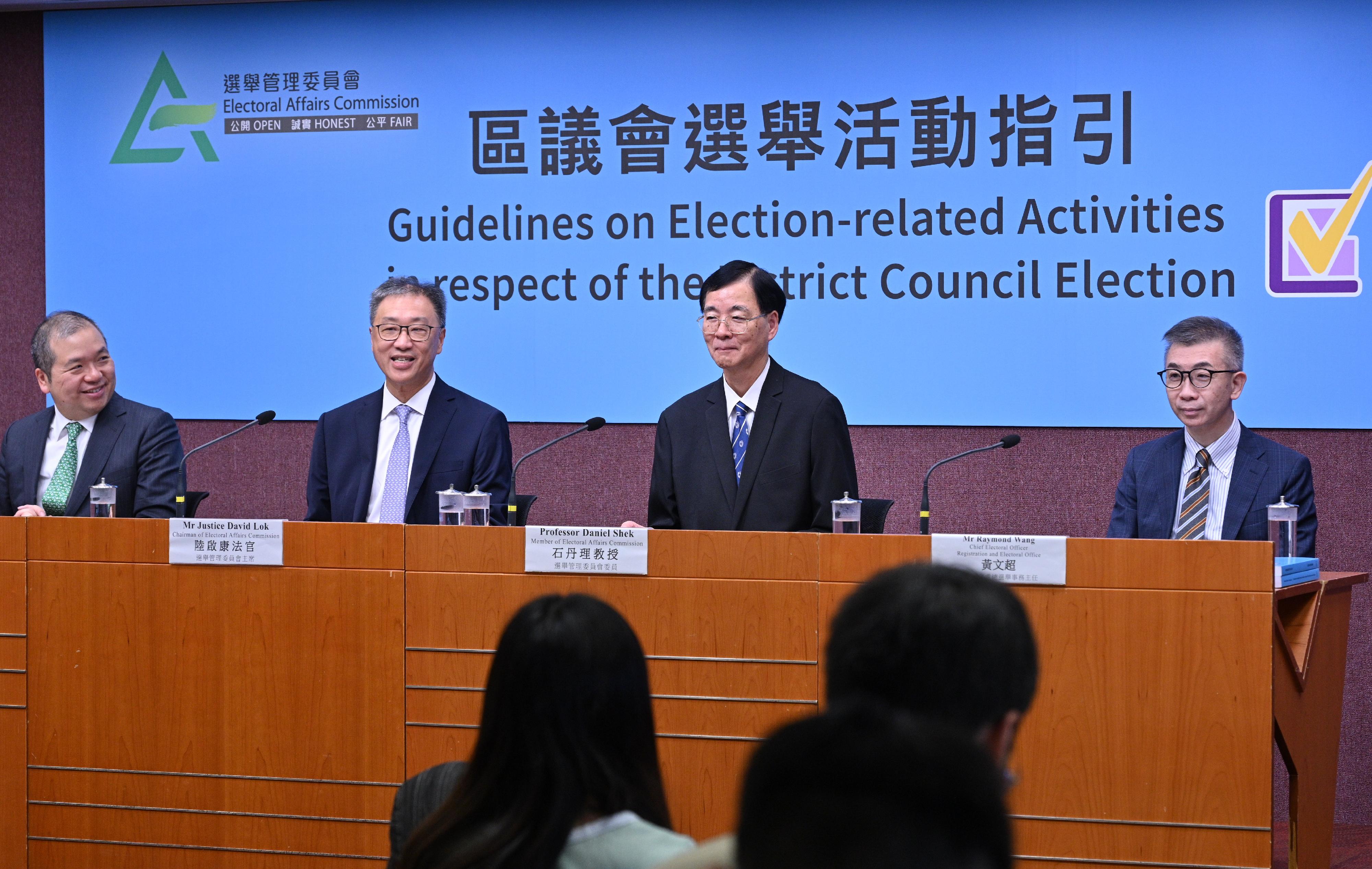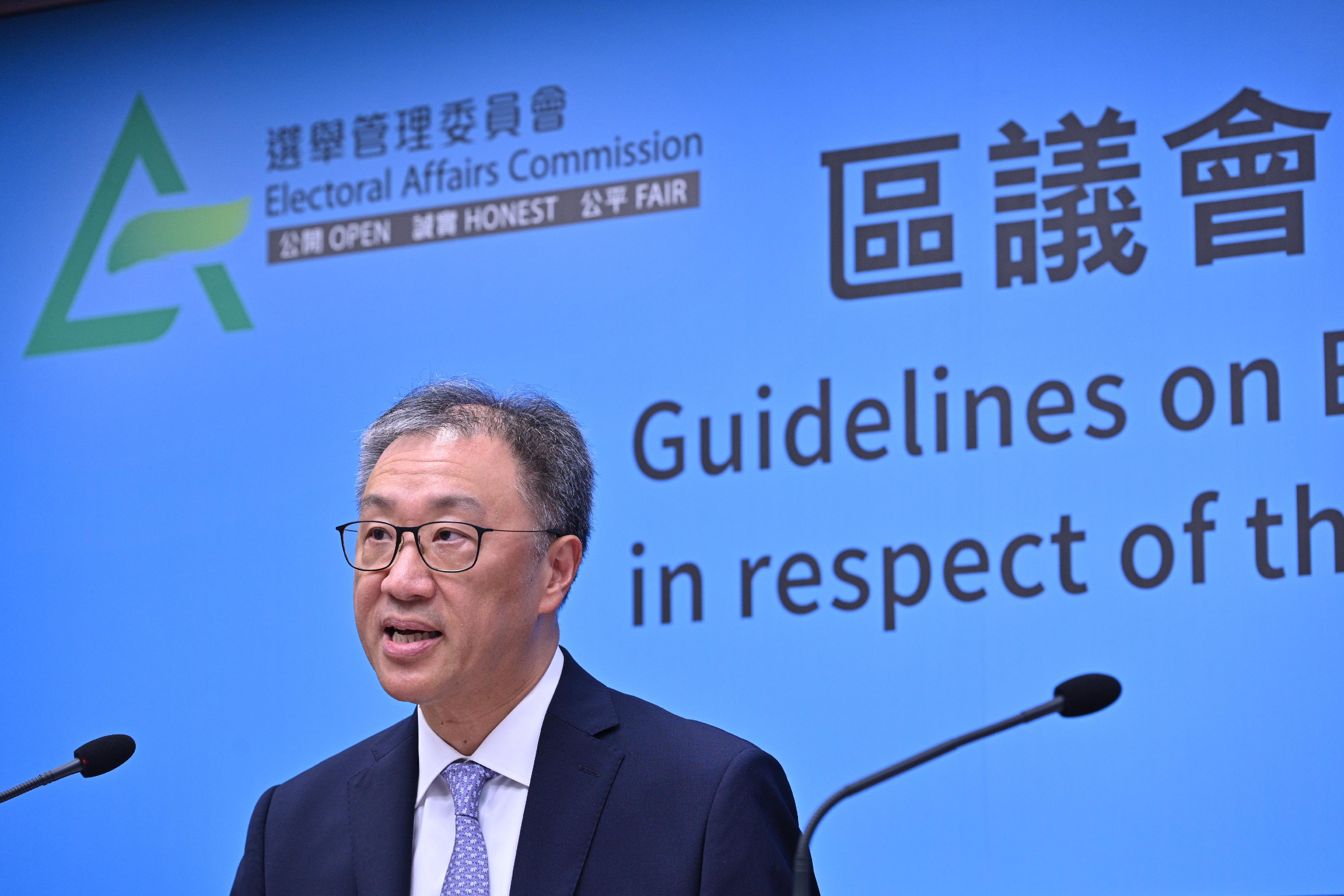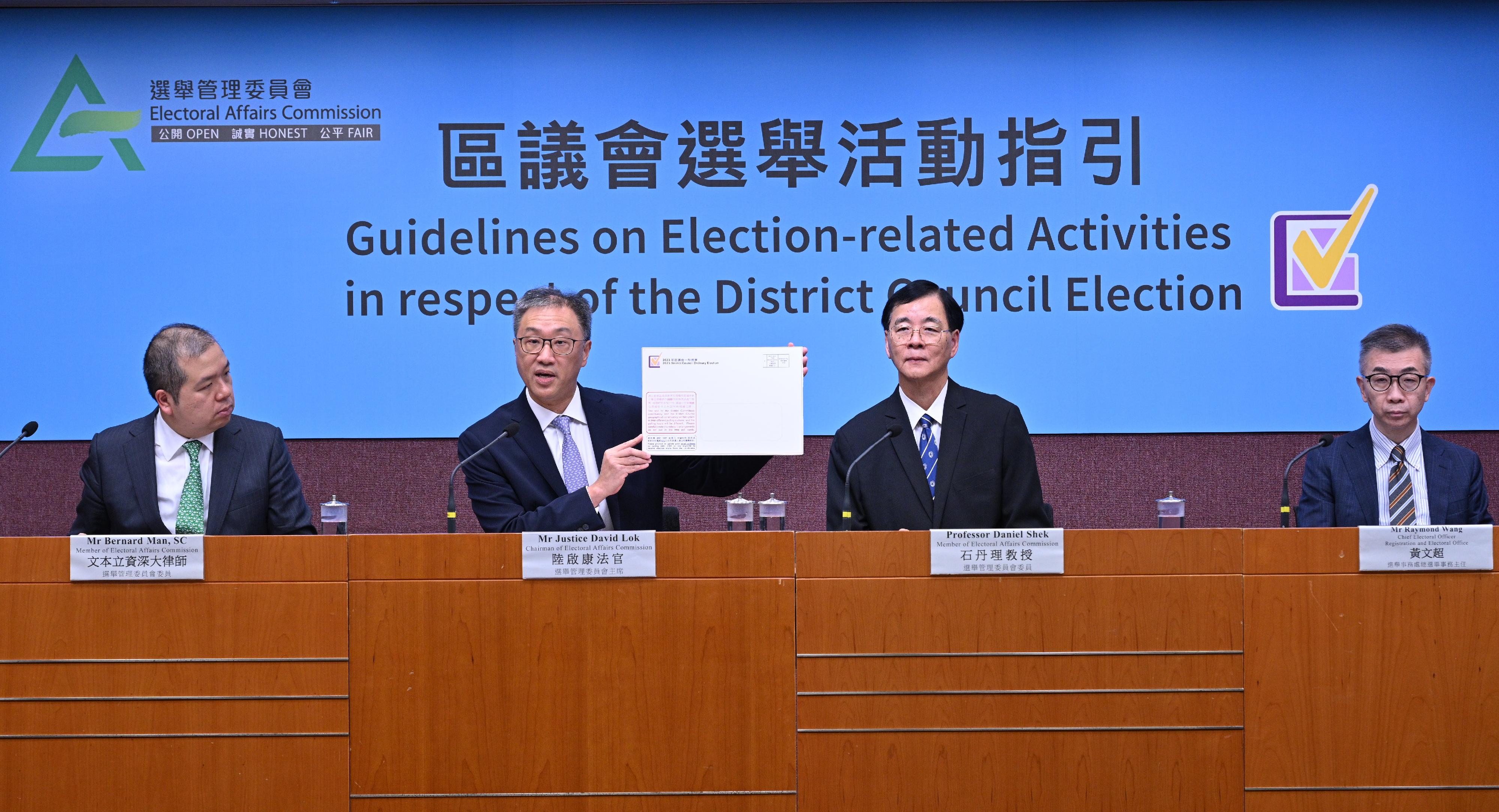Guidelines for District Council Election issued today (with photos/video)
*************************************************************************
The Electoral Affairs Commission (EAC) today (September 28) issued the Guidelines on Election-related Activities in respect of the District Council Election according to the Electoral Affairs Commission Ordinance (Cap. 541).
"The Guidelines apply to the 2023 District Council Ordinary Election (DCOE) to be held in December this year and District Council by-elections afterwards," the EAC Chairman, Mr Justice David Lok, said at a press conference.
The Guidelines are updated on the basis of the edition issued in September 2019, with appropriate and necessary amendments. The amendments are primarily classified into three areas: the first category reflects the amendments to relevant electoral laws, mainly the District Councils (Amendment) Ordinance 2023 (the Ordinance) passed by the Legislative Council in July this year which covers the composition of the reformed District Council and the returning methods, and the nomination process of candidates; the second category is the amendments made to align with other electoral guidelines; and the third category is the elaboration of new electoral arrangements and procedures, such as the nomination and voting arrangements of the newly established District Committees constituency (DCC), etc.
Composition of the District Councils
The Ordinance was published in the Gazette and came into effect on July 10. The 470 District Council members will be composed of appointed members, ex officio members, District Council geographical constituency (DCGC) members and DCC members. Among them, 179 appointed members are appointed by the Chief Executive, 27 ex officio members are filled by the 27 Chairmen of Rural Committees, while 88 DCGC members and 176 DCC members are returned by elections.
For the DCGC, there are a total of 44 DCGCs in the 18 Districts. Two members will be returned for each DCGC, resulting in a total of 88 DCGC members to be returned. The "double seats and single vote" voting system is adopted. Each DCGC will return two members, and each elector may vote for one candidate for the respective DCGC. The two candidates who obtain the greatest and the next greatest numbers of votes shall be returned as members for that DCGC.
For the newly established DCC, 176 members will be elected by the members of the District Committees (i.e. the Area Committees, the District Fight Crime Committees and the District Fire Safety Committees) (collectively known as the "three committees") who have registered as the geographical constituency electors. The "block vote" voting system is adopted. Each DCC elector must vote for no more and less than the number of vacancies for that DCC, otherwise the ballot paper will be deemed as invalid.
Nomination of candidates
The Ordinance has amended the nomination methods in a District Council election. All candidates must be nominated by a specified number of members of the "three committees".
A candidate of a DCGC, in addition to being nominated by not less than 50 but not more than 100 electors for the DCGC, must at the same time be nominated by not less than three but not more than six members in each of the District Committees in the relevant District as electors for the DCC.
A candidate of a DCC does not have to be a member of the "three committees" but must be nominated by not less than three but not more than six members in each of the District Committees in the relevant District as electors for the DCC.
For each DCC elector, he/she may nominate up to the number of members to be returned for the respective DCC in the District and not more than one candidate for each DCGC in the District.
According to the amended District Councils Ordinance (Cap. 547), the District Council Eligibility Review Committee is responsible for reviewing and confirming the eligibility of all candidates at District Councils election, appointed and ex officio members.
The nomination period for the 2023 DCOE will start on October 17 until October 30. Persons who wish to stand for an election are advised to submit their nominations as early as possible to allow time to correct mistakes, if any, in the nomination forms before the close of nomination period.
Polling hours
The Registration and Electoral Office (REO) plans to set up about 600 DCGC ordinary polling stations (OPSs), as well as 18 DCC polling stations and a maximum of 48 dedicated polling stations for the DCOE. The Electronic Poll Register (EPR) system will continue to be implemented for issuing ballot papers in this DCOE. With reference to the arrangements for the 2021 Legislative Council General Election (LCGE), the polling hours for DCGC OPSs will be from 8.30am to 10.30pm (14 hours in total). As for the dedicated polling stations set up inside penal institutions, the polling hours will be from 9am to 4pm. As there are only about 2 500 DCC electors, the polling hours for the 18 DCC polling stations will run from 8.30am to 2.30pm (six hours in total).
Mr Justice Lok said, "Both the DCGC and DCC electors can refer to the poll cards to be issued to them by the REO about the relevant polling hours. The REO will remind DCC electors on the envelope for the poll cards issued to them that the poll for the DCC and the DCGC will take place in two different polling stations."
Polling arrangements
Similar to the public elections in recent years, the EPR system will be adopted to verify electors' identities and issue ballot papers at most OPSs and DCC polling stations for a more accurate and efficient issuance of ballot papers, except for dedicated polling stations and the polling stations affected by factors such as no or poor coverage by broadband or telecommunication networks.
Special queues will be set up for electors with special needs. The Presiding Officers will set up two queues outside each polling station, one for persons who are aged 70 or above, persons with disabilities and pregnant women; while another one for the ordinary electors. Seats will also be provided in the polling stations for persons in need of rest, and to join the queue afterwards for collecting their ballot papers. As in the past, the Presiding Officers will arrange as far as possible for their polling staff to go to vote at their assigned polling stations in light of the actual situation of the polling stations and will adopt measure to enable them to cast their votes.
New arrangement for submitting copies of election advertisements and relevant information
Under the Guidelines, the EAC has relaxed the deadline for requiring candidates to submit election advertisements (EAs) and consent of support from within one working day after the publication of the EAs in the past to within three working days. This facilitates the candidates to conduct their electioneering activities and allow more time for them to provide the Returning Officers with copies of the EAs and relevant information and documents, including the publication information pertaining to the EAs, the permission/consent of support or relevant electronic copies, to an open platform (i.e. the "Central Platform" maintained by the Chief Electoral Officer or the "Candidate's Platform" maintained by the candidates) for public inspection.
Mr Justice Lok said, "The new arrangement has taken into account the views that candidates have to cope with a huge amount of electioneering work during the election period. It is difficult for them to submit relevant information and documents within one working day after the publication of the EAs. Having balanced various considerations and the needs of different stakeholders, as well as reviewing the existing practice for EA publication, the EAC is of the view that the relaxation is a reasonable arrangement. The EAC will closely monitor the effectiveness of the new arrangement and review it as appropriate."
Election expenses
The Guidelines set out the amended maximum amount of election expenses for District Council election under the Ordinance. The maximum amount of election expenses for a candidate of the DCC is $100,000. The maximum amount of election expenses for a candidate of the DCGC ranges from $512,400 to $951,600, depending on the size of the DCGC. Election expenses are regulated by the law to ensure that the candidates compete on a level playing field within a reasonable level of expenditures.
Mr Justice Lok reminded that candidates must submit an election return before the expiry of the period of 60 days after the election is settled or within the extended period as permitted by the Court of First Instance under the relevant electoral law.
Media reporting in relation to the DCC
The number of seats and candidates of the DCC is considerably large. When producing and publishing news reports and feature reports related to the election of a certain candidate, the media may have practical difficulties in mentioning all the other candidates of a DCC in the same programme or publication. Therefore, the Guidelines state that the media can choose to provide viewers, listeners or readers with the total number of candidates of a DCC during the programme or in the publication, and mention the platform maintained by the media such as the webpage of the organisation/programme/publication in which the names of the other candidates of the DCC can be found. This practice is the same as the one adopted for the Election Committee constituency in the 2021 LCGE.
Mr Justice Lok added, "The EAC has not conducted public consultation on the Guidelines this time. It is mainly because the Ordinance was enacted in July and the nomination period for the 2023 DCOE is about to commence, resulting in a rather tight schedule for issuing the updated Guidelines. In addition, the major changes in the Guidelines aim to reflect the amendments under the Ordinance and other related legislation which have been discussed and passed by the Legislative Council."
The Guidelines can be downloaded from the EAC's website (www.eac.hk). They are also available for viewing at the REO and the Home Affairs Enquiry Centres of all District Offices.
Ends/Thursday, September 28, 2023
Issued at HKT 16:45
Issued at HKT 16:45
NNNN








